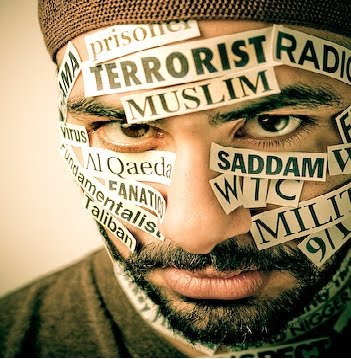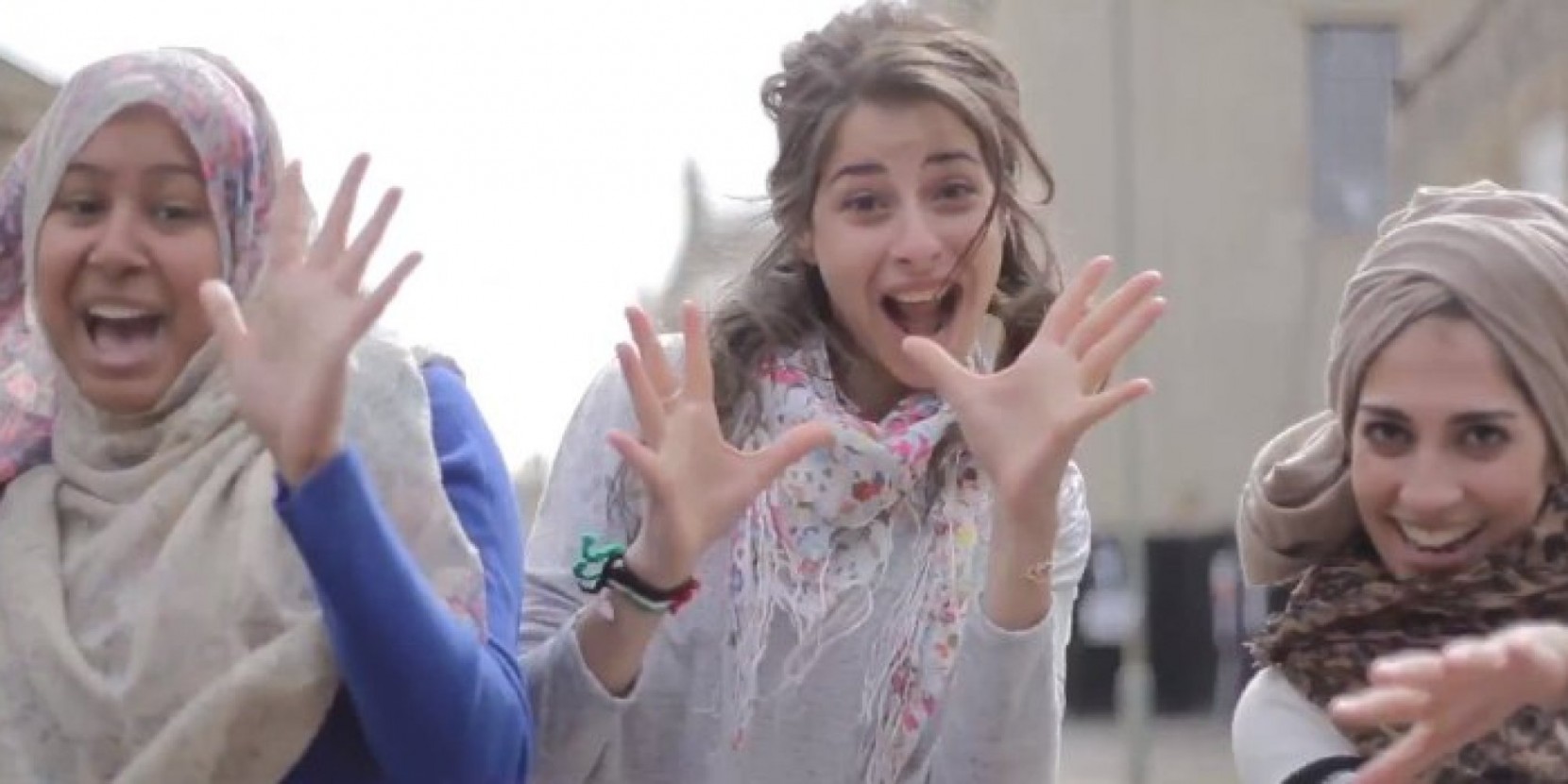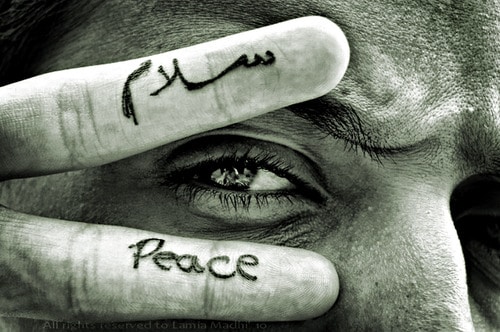A group of British Muslims recently produced a video based on Pharrell William’s song #Happy depicting them dancing in the streets of (essentially) London, on a bright sunny day, when the world is all glorious and peaceful, and they are full of so much joy that they want to share it with the rest of us: singing, dancing, miming to the song. And that is all there is to it.
Only, that is not all there is to it. The first emotion that gripped me in seeing this odd, bizarre, contrite performance of ‘happiness’ was how unnatural and staged the whole event is. You see, this is not simply about a group of people coming together to express joy: this is a specific agenda, by an elitist, affluent and political / media savvy middle-class group, who it seems that in yet another attempt at apologia, are offering a palatable, sanitised, acceptable, ‘version’ of both ‘Muslimness’ and ‘happiness’ – a forced attempt at that.
The video has gone viral and elicited many positive comments to the effect that it induces sheer joy and is nothing but refreshing. Some commentators have gone as far as to say that it is almost a new depiction of the Persian, Turkish and Mughal miniatures that challenged the image of an austere Muslim life.
However, I would like to raise a question as a British Muslim who identifies with absolutely nothing in this video: precisely what is refreshing about a group of Muslims who appear to be so reactive and apologetic for being Muslims, that they appear as if they are desperate to ‘show’ they are happy? How is happiness measured? If the Western media, governments and powers that be have decided that happiness is measured by dancing and singing, then should all groups, no matter what race, creed, faith or culture, be obliged to accept that definition of happiness? Is Western cultural hegemony the only way forward?
 To me, the video embodies a deep underlying problem of acceptance. Just as the imperial colonising powers produced the ‘other’ and measured the world accordingly, so have recent Western governments produced their own definitions of civilisation and acceptable behaviour and beliefs: the very discourse of ‘moderate Muslims’ illustrates my point, as does the apparent subjugated response of those reactive Muslims in Britain who are desperate to scream out that they are ‘moderate’. Do we have to prove that we are moderate? That would in itself entail an assumption that Islam and Muslims are not moderate per se. Hence, a video of well-known Muslims dancing carries the dangerous ‘admission / assumption’ that Muslims, by virtue of being Muslims, are not happy.
To me, the video embodies a deep underlying problem of acceptance. Just as the imperial colonising powers produced the ‘other’ and measured the world accordingly, so have recent Western governments produced their own definitions of civilisation and acceptable behaviour and beliefs: the very discourse of ‘moderate Muslims’ illustrates my point, as does the apparent subjugated response of those reactive Muslims in Britain who are desperate to scream out that they are ‘moderate’. Do we have to prove that we are moderate? That would in itself entail an assumption that Islam and Muslims are not moderate per se. Hence, a video of well-known Muslims dancing carries the dangerous ‘admission / assumption’ that Muslims, by virtue of being Muslims, are not happy.
Again, to critics who cry that this is a spontaneous capture of moments of happiness, my response is that there is nothing spontaneous here. The Honesty Policy, an anonymous body of people, claim that, ‘if it [Honesty Policy] is going to be about anything it’s about shifting parameters – a movement away from established familiar structures with the intent of becoming a relevant, contemporary and accessible community.’ So its agenda is to destabilise traditional structures on the assumption that they do not work. The team sent anonymous emails to people – must have been a select handpicked few as I did not receive one – to take a camera with them and go and film Muslims being happy. Their aim?
We Brits have a bad rep for being a bit stiff, but this video proves otherwise. We are HAPPY. We are eclectic. We are cosmopolitan. Diverse. Creative. Fun. Outgoing. And everything you can think of. This video is to show the world despite the negative press, stereotypes and discrimination we are burdened with we should respond with smiles and joy, not anger.

And herein lies the problem. Let me clarify: I am not angry. However, the video depicts very few ordinary, under-privileged working class Muslims who represent the majority of Muslims in the UK caught in the inescapable trap of the brunt of David Cameron’s austerity measures. Nor does it depict diversity in British Muslims – not ethnic, but of different theological leanings. Perhaps that is because the majority of Muslims did not want to be involved in a video that they felt challenged their given norms of behaviour and would undermine and gloss over the real issues facing Muslims in Britain. The majority of people are well known, middle class, professional Muslims essentially from the Sunni school, either involved in politics or the media (Julie Siddiqui, Salma Yaqoob, Fuad Nahdi, Myriam Cerrah, Abdul-Hakim Murad, Mo Ansar, Abdul-Rehman Malik amongst others). That is, these are very media savvy people who ironically seem to be laughing at an unsuspecting audience who might not realise that these people have not just been chosen at random, but are perhaps part of a highly engineered video?
I do not think the video is one to be taken light-heartedly: I think it is a most damaging statement on Muslims, from within. It is not a feel-good video that just came out of a vacuum and was driven by the agenda of just simply being a cultural expression. It is a highly politically-motivated production driven by apologia and a need for acceptability.
Why do I have to display happiness through a public performance that offends my spiritual, moral and theological beliefs on how happiness may be expressed? How is happiness measured? I am not interested here in the petty arguments raised by some about whether the video was promoting free mixing: it is clear that family members were ‘performing’ their happiness scenes together. What I am interested in is the need to feel this was necessary at all.
There is a huge power discourse behind the production of the video if we deconstruct its various elements. Who is its target audience? British Muslims? I think not. Its purpose is perhaps to explain to non-Muslims that we are just like you: can laugh and dance (like you); sing (like you). My discomfort with this is – why do I have to be like you or anyone else? Why can I not be accepted for who I am, with my own value systems, which incidentally enhance me as a member of society, rather than producing some dangerous psychotic being? Why is my display of happiness – submersion in prayer, contemplation, being at one with nature and the universe, with whispered words of gratitude – not an acceptable way of being happy? That is, is this neo-orientalism at work here? With the implication that the Muslim is still the ‘other’ and must be sanitised and de-Islamicised to be acceptable? Is Islam in need of reform for Muslims to be acceptable in the West? And in displaying my normality, how far am I expected to go? Supporters of the video may find it innocuous. However, critics argue that it contravenes Islam to the same extent as expecting Muslims to go down to the pub for a pint. The core of my concern is why difference is so problematic. The video for me is nothing short of mimicry, imitation, projected as a harmless, boisterous, uncomfortable dance routine.
Islam, whether in Britain or elsewhere, is about the Transcendent Divine, and embracing the Divine should not be tampered with through fear of the world, acceptability and self-imagery. The political drive behind peddling the ‘moderate’ Muslim is of grave concern; but of even greater concern is the list of Muslims lining up to prove that they are ‘moderate’. Islam is moderation par excellence. Normality and nature are the hallmarks of a spiritual life. Are we still living in times where we have to justify what we believe and why? These are not the ideals of a democratic world.
And finally, on the issue of happiness: yes, there is a great deal of focus on the unhappiness of British Muslims, but we must get to the core reasons for this. Low living standards, poor education and discrimination feature high when assessing British Muslim life: all is not well in the land of milk and honey. I am fully aware that I myself am part of a privileged group. However, that must not cloud my judgement in assessing that this video does not represent the majority of British Muslims who are not only caught in the drudgery of working life, but who are also weighed down by the unjust invasion-led foreign policies of Western powers in Muslim lands, who are stigmatised by the extremism / terrorism discourse, and who theologically would not agree with such expressions of ‘happiness’. In terms of Islamic guidance on ‘happiness’, there is indeed a natural desire for humans to seek this out, but Islam equates it with peace and contentment. The Quran ties happiness to God’s inexplicable pleasure in, and acceptance of, humans (Chapter 89, al-Fajr) and with a ‘good life’ (Chapter 16, an-Nahl). The Prophet Muhammad described happiness in terms of attaining knowledge, but he also acknowledged that materialism impacted on happiness while warning that not materialism but contentment would secure it.
Imam Ali listed nine points which define and guide people towards happiness: rely on God when pleased and grieved; be aware of God when alone, travelling, or at home; do not coerce anyone no matter how much s/he wrongs you; do not worry unduly no matter how high your concerns pile; live simply no matter how great your status; hope for goodness no matter how serious the affliction; give a lot even when you are deprived; smile even if your heart is bleeding; and do not stop supplicating for others even in their absence.
Thus, do privileged, reformist, non-traditional British Muslims have the right to speak on behalf of the majority ‘other’? Is it appropriate to display happiness in a way that the majority would not recognise? That is the question.






